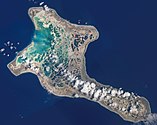Wikipedia:Main Page/Yesterday
From yesterday's featured article
The Brinks Hotel bombing occurred in Saigon on December 24, 1964, during the Vietnam War. Two Viet Cong operatives detonated a car bomb under the hotel, which housed United States Army officers. The explosion killed two Americans and injured approximately 60 other people. The Viet Cong commanders had two objectives: to demonstrate their ability to strike in South Vietnam should the United States decide to launch air raids against North Vietnam, and to show the South Vietnamese that the Americans could not be relied upon for protection. The bombing prompted debate within United States president Lyndon B. Johnson's administration. Most of his advisers favored retaliatory bombing of North Vietnam and the introduction of American combat troops, while Johnson preferred the existing strategy of training the Army of the Republic of Vietnam to protect South Vietnam from the Viet Cong. In the end, Johnson decided not to take retaliatory action. (Full article...)
Did you know ...
- ... that the 2022 Andover tornado (video featured) injured only three people, despite damaging more than 1,000 buildings?
- ... that Dithapelo Keorapetse was named Speaker of the National Assembly of Botswana shortly after losing his bid for election to the legislature?
- ... that the 1962 space-age pop album Latin-esque was recorded with halves of the orchestra separated by almost a city block to heighten its stereo effects?
- ... that Bob Gandey founded a circus that continues to be operated by his descendants more than a century later?
- ... that Hudson's Bay Company ships reserved special rooms for important Lower Chehalis visitors due to their key role in regional trade networks?
- ... that referee Mike Hasenfratz acted in an ice hockey fight in Stay Tuned?
- ... that Planting a Rainbow has been praised for both its "deft use of colors" and the educational identification of seeds, bulbs, sprouts, and blossoms?
- ... that David Bookbinder was Margaret Thatcher's "least favourite local government leader"?
- ... that entitativity refers to how "groupy" a group is?
In the news (For today)
- A multi-vehicle crash in Minas Gerais, Brazil, leaves 41 people dead.
- A car attack (aftermath pictured) at a Christmas market in Magdeburg, Germany, kills five people and injures more than two hundred others.
- In France, Dominique Pelicot and 49 other men are convicted of the serial rape of his then-wife Gisèle Pelicot.
- A 7.3-magnitude earthquake hits Vanuatu's capital, Port Vila, leaving at least sixteen people dead.
On the previous day
- 759 – The Tang-dynasty poet Du Fu departed for Chengdu, where he lived for the next five years and composed poems about life in his thatched cottage.
- 1777 – An expedition led by English explorer James Cook reached Christmas Island (pictured), the largest coral atoll in the world.
- 1814 – The United Kingdom and the United States signed a peace treaty in Ghent, present-day Belgium, ending the War of 1812.
- 1979 – The Soviet government deployed troops in Afghanistan, starting the Soviet–Afghan War.
- 1999 – Jihadists linked to al-Qaeda hijacked Indian Airlines Flight 814 to force the release of Islamist figures held in prison in India.
- Maslama ibn Abd al-Malik (d. 738)
- George Crabbe (b. 1754)
- Adam Exner (b. 1928)
- Turid Birkeland (d. 2015)
Yesterday's featured picture
|
20,000 Leagues Under the Sea is an American silent film directed by Stuart Paton and released on December 24, 1916. Based primarily on the 1870 novel Twenty Thousand Leagues Under the Seas by Jules Verne, the film also incorporates elements from Verne's 1875 novel The Mysterious Island. This was the first motion picture filmed underwater. Actual underwater cameras were not used, but a system of watertight tubes and mirrors allowed the camera to shoot reflected images of underwater scenes staged in shallow sunlit waters in the Bahamas. For the scene featuring a battle with an octopus, cinematographer John Ernest Williamson devised a viewing chamber called the "photosphere", a 6-by-10-foot (1.8-by-3.0-metre) steel globe in which a cameraman could be placed. The film was made by the Universal Film Manufacturing Company (now Universal Pictures), not then known as a major motion picture studio, and took two years to make, at the cost of $500,000. Film credit: Stuart Paton
Recently featured:
|
Other areas of Wikipedia
- Community portal – The central hub for editors, with resources, links, tasks, and announcements.
- Village pump – Forum for discussions about Wikipedia itself, including policies and technical issues.
- Site news – Sources of news about Wikipedia and the broader Wikimedia movement.
- Teahouse – Ask basic questions about using or editing Wikipedia.
- Help desk – Ask questions about using or editing Wikipedia.
- Reference desk – Ask research questions about encyclopedic topics.
- Content portals – A unique way to navigate the encyclopedia.
Wikipedia's sister projects
Wikipedia is written by volunteer editors and hosted by the Wikimedia Foundation, a non-profit organization that also hosts a range of other volunteer projects:
-
Commons
Free media repository -
MediaWiki
Wiki software development -
Meta-Wiki
Wikimedia project coordination -
Wikibooks
Free textbooks and manuals -
Wikidata
Free knowledge base -
Wikinews
Free-content news -
Wikiquote
Collection of quotations -
Wikisource
Free-content library -
Wikispecies
Directory of species -
Wikiversity
Free learning tools -
Wikivoyage
Free travel guide -
Wiktionary
Dictionary and thesaurus
Wikipedia languages
This Wikipedia is written in English. Many other Wikipedias are available; some of the largest are listed below.
-
1,000,000+ articles
-
250,000+ articles
-
50,000+ articles

